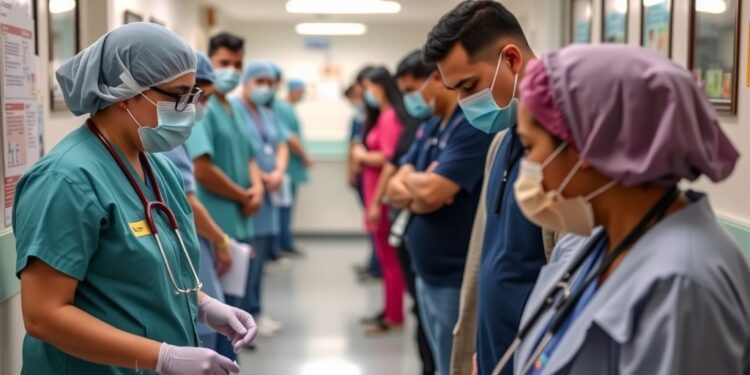In the landscape of American health care, one cannot overlook the vital presence of noncitizen immigrants, numbering over 1 million. A staggering one-third of these individuals are undocumented, playing crucial roles that are not easily filled. Their contributions span a wide range of sectors within health care, including nursing, medical research, and technical support roles, where they provide essential services and support to an already strained system. The importance of these workers has become especially pronounced amid discussions of immigration policy reform and its implications on the availability of health care personnel.
Indeed, the potential implications of shifts in immigration policy under various administrations, especially during the Trump presidency, raise critical concerns. President Trump’s proposed plans to increase deportation of undocumented immigrants could result in significant repercussions for the health care workforce, particularly in areas where medical facilities already suffer from staff shortages. The intersection of immigration and health care reveals a complex landscape where policy decisions could directly impact patient care and access to services.
The ramifications of removing noncitizen health care workers extend beyond individual employment scenarios; they strike at the core of health care delivery in the United States. The skills possessed by these workers are often specialized, making it challenging to replace them. A reduction in their numbers could lead to a decrease in the quality of care, longer waiting times for patients, and heightened pressure on the remaining workforce, which is already at capacity. The health care system functions as a finely tuned machine, and any disruption could lead to significant operational and logistical issues.
Moreover, the presence of undocumented immigrants in the workforce is not solely about numbers; it also highlights broader themes of equity, diversity, and social justice within the American labor force. Many noncitizen workers have been on the front lines of the health care crisis, particularly during times of crisis such as the COVID-19 pandemic. They have rendered indispensable services while often facing personal risks, including health hazards and potential deportation. Their experiences reveal the multifaceted nature of their contributions and the need for policies that acknowledge their roles in building a robust healthcare system.
Beyond the immediate concerns of personnel shortages and patient care, there lies a more complex narrative relating to the demographic landscape of the United States. As the population continues to age and the demand for comprehensive health care services grows, the need for a diverse and well-represented workforce will only increase. The current climate of uncertainty surrounding immigration threatens to erode the very foundations of this workforce, which is essential for addressing the health care needs of diverse communities across the nation.
Philosophically, this situation draws attention to the ethical implications of health care delivery. When policies prioritize barring individuals based on their citizenship status, they diminish the richness that a diverse workforce brings to patient care. Each health care worker, irrespective of their immigration status, contributes unique perspectives and cultural competencies that can enhance patient interaction and treatment outcomes. The ideas and experiences brought by immigrants enrich the tapestry of American society, and it is crucial to recognize and advocate for their place within the health care system.
Furthermore, as researchers continue to investigate the impacts of immigration policy on the health care system, they highlight the critical intersections between health care access and immigration status. For instance, studies have shown that undocumented individuals often face barriers to receiving necessary medical care, leading to poorer health outcomes in communities that rely heavily on these workers. This unfortunate reality underscores the urgent need for reforms that treat health care as a universal right rather than a privilege tied to immigration status.
As we look to the future, questions about the sustainability of health care delivery in the U.S. demand urgent attention. Policymakers must consider comprehensive immigration reform that supports rather than hampers the utility of noncitizen health care workers. This includes tackling systemic barriers that hinder equitable access to care, as well as fostering an environment that values the contributions of immigrants. The health care system’s resilience may depend on our collective action to safeguard the rights and roles of all health care workers.
The subsequent debate surrounding immigration policy is likely to continue, with implications that reach far beyond the realm of health care. Advocacy for humane immigration practices is vital, as is fostering appropriate legislative frameworks that promote rather than deter noncitizen workers from entering and remaining in the health care sector. These discussions will require robust dialogue among stakeholders, including legislators, health care professionals, and community advocates focused on nurturing a health care system that is equitable and inclusive.
The future of health care in the United States will hinge on our ability to build coalitions that advance humane and rational immigration policies, reflecting the inherent value of all individuals who contribute to our communities. By ensuring that noncitizen workers feel safe and supported within the workforce, we create a more robust and responsive health care infrastructure capable of meeting the challenges ahead.
In the end, improving the health care delivery system isn’t solely about the numbers of workers available but also about creating a culture that embraces diversity, inclusivity, and the shared goal of providing high-quality health care for all American citizens. As we witness shifts in this complex landscape, we are reminded that the collective resilience of the health care community depends significantly on how we value and protect our workforce, especially the noncitizens who play an integral role in it.
Subject of Research: Noncitizen Immigrants in Health Care
Article Title: The Indispensable Role of Noncitizen Workers in U.S. Healthcare
News Publication Date: [Not specified]
Web References: [Not specified]
References: [Not specified]
Image Credits: [Not specified]
Keywords: Noncitizen workers, immigration policy, health care, U.S. demographics, patient care, equity, diversity, health care delivery.




